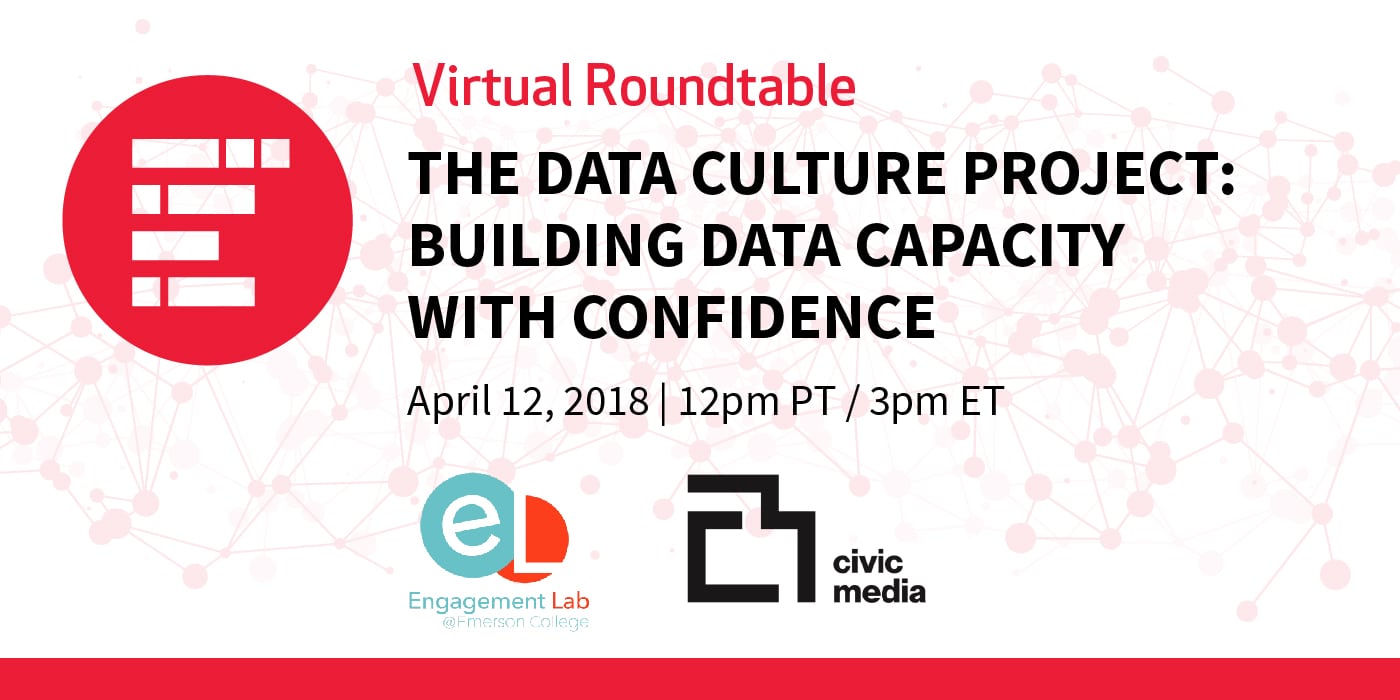Architects of The Data Culture Project discuss a hands-on, self-service curriculum that empowers professionals at any level to work with data.
Many organizations struggle to find ways to build capacity to work with data. Learning to work with data is like learning a new language; immersing yourself in the culture brings the best results. But trying to build a data culture can be a lonely effort in organizations that haven’t recognized the importance of data.
The Data Culture Project is set to change all of that. With funding from a Digital Impact Grant, The Engagement Lab at Emerson College and MIT Center for Civic Media joined forces with 30+ organizations to develop a resource that would demystify data literacy. The result is a hands-on, self-service curriculum that empowers professionals of all experience levels to ask questions, gather and analyze data, tell stories, and experiment with different audiences.
Audio Podcast and Transcript
Download the transcript (PDF), watch the discussion using the media player, or listen by using the audio player below or by visiting the Digital Impact podcast on iTunes.
[powerpress]
Highlights
- Think of data as an asset: First, data can help you streamline your operations and make your process more efficient. Second, data can help you spread your message. Infographics and using data to tell a story are a few examples. Third, data can help bring people together; think of data as a “campfire to bring people around.” But remember, data can also be a toxic asset. Developing strategies for how you use and present your data, and how you handle any tension around your data, is essential.
- Don’t get lost in the technical: Many people look at data and assume they have to be highly technical, which leads to unnecessary jargon and technical thinking, and ultimately fails to connect to the everyday work people are doing.
- Be creative: Take an arts-based, creative approach to building a data culture at your organization. Building capacity requires doing things differently. For instance, using office supplies (paper, markers, colored sticky notes) may flip your creative switch.
- Use your data to break down silos: Data are often situated in one place, but departments and teams can connect around the data to solve problems in ways they can’t when going it alone.
- Building a data culture isn’t a one-size-fits-all solution: For instance, you don’t need a big budget to have a data culture. Look at what works for others, and test different solutions at your organization.
- Develop a recruiting strategy: Best practices learned from the pilot: 1) Pizza is a magnet, 2) schedule the activity early, then wrangle people the day of the event, and 3) explain to folks that it’s NOT a spreadsheet training. People might have expectations about a highly technical and difficult activity, but Data Culture Project is not that!
Speaker-Recommended Resources
- Data Culture Project
- DataCultureProject.org
- Introduction to the self-service learning program includes video
- DataBasic.io
- A suite of easy-to-use web tools for beginners that introduce concepts of working with data
- Data Therapy
- A blog that shares processes, tools and tutorials to help people present and share their data in creative ways
- Data Culture Project Group
- Mailing list for people interested in the Data Culture Project
- Build A Data Sculpture!
- Data sculpture example video
- Data Murals
- Gallery of data murals in the United States and beyond.
- DataCultureProject.org
- From the Audience
- Dabbling in the Data Guide
- Guide to participatory data interpretation published by Public Profit
- Dabbling in the Data Guide
- Other Resources
- Datawrapper
- Enrich your stories with easy-to-create charts
- Google Charts
- Display live data on your site
- Tableau
- Tableau helps the world’s largest organizations unleash the power of their most valuable assets: their data and their people
- Datawrapper
What are your thoughts on building data cultures? Leave a comment below and share on social with #DataCultureProject.

